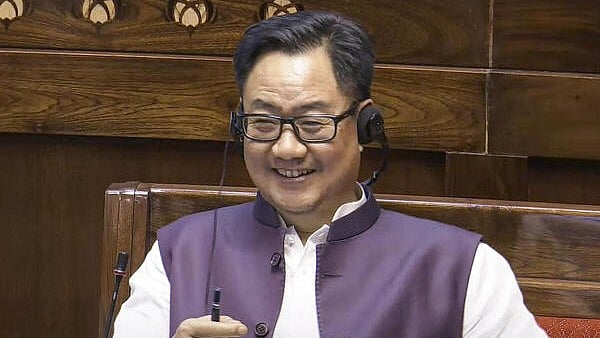
The Upper House cleared the bill after 12 hours of intense debate, a day after the Lok Sabha passed it with a 288-232 margin in the early hours of Thursday also after over 12 hours of debate.
Credit: PTI Photo
New Delhi: The Parliament passed the contentious Waqf (Amendment) Bill, 2025 with the government mustering the numbers to get the Rajya Sabha’s stamp of approval on early hours of Friday after yet another marathon debate. The Bill got 128 votes in its favour and 95 against after all the amendments moved by the opposition were rejected
The opposition parties pilloried the Centre for bringing a law against secular and democratic norms, while the government claimed the bill would be restricted only to managing Waqf properties and would not interfere with the religion.
The Upper House cleared the bill after 12 hours of intense debate, a day after the Lok Sabha passed it with a 288-232 margin in the early hours of Thursday also after over 12 hours of debate.
Responding to the debate, Union Minority Affairs Minister Kiren Rijiju assured that there would not be any interference to any religious institutions after the bill was passed and non-Muslim members in the administrative bodies were necessary because government agencies like the Waqf council should be secular in character.
Rijiju said the legislation would not snatch away the rights of the Muslims and would bring in the much needed “transparency, accountability and efficiency in the management of Waqf properties.”
As sparks flew, the Leader of the Opposition and Congress president Mallikarjun Kharge, said the legislation would sow the seeds of discrimination in the country as it tries to suppress the Muslims.
“Will the government put Muslims or even Dalit Hindus like me in the board of Tirupati or Ram Temple,” Kharge said, flagging one of the controversial provisions of including non-Muslim members in the Central Waqf Council.
Participating in the debate J P Nadda, the Leader of the House and BJP president said though BJP was a party to the 2013 amendment to the Waqf act, the law introduced by the Congress-led UPA government was a “draconian and overarching” one that challenged the basic spirit of the Constitution.
“Law making is a continuous process of evolution. The current bill is in national interest rather than in the interest of any vote bank,” he said.
Nadda said between 1913-2013, there were 18 lakh acres of Waqf properties, but the number ballooned to an additional 21 lakh acres between 2013-2023. “To avoid misuse of such a huge amount of property, this law is needed,” he said.
The opposition parties cornered the government for removing the option of “Waqf by users” from the law and provisions like only a practising Muslim for five years is eligible to donate a property as Waqf.
“How will you identify a practising Muslim? Will you put CCTV cameras in houses and Masjids? Will there be a separate department for this? Will the government give certificates on who is a practising Muslim for five years,” asked Congress MP from Karnataka Syed Naseer Hussain who opened the debate.
"This bill is based on falsehood and a misinformation campaign. It is based on a false narrative which has been built over the last five-six months," Hussain said, claiming all the suggestions made by opposition members to the JPC were rejected.
Several opposition members said the bill violates Article 14 (Equality before law), Article 25 (Freedom of conscience and free profession, practice and propagation of religion) and 26 (freedom to manage religious affairs) of the Constitution.
“The legislation will be declared unconstitutional in a few years,” said Congress leader Abhishek Manu Singhvi.
What's New in the Waqf (Amendment) Bill?
* Nullifies Sec 40 in Waqf Law that provides power to Waqf Boards to declare properties as Waqf
* Central and State Waqf Boards to have non-Muslims, women members
* Officer above rank of Collector to determine disputes on whether a property is Waqf-owned or government-owned
* State Govt can appoint Waqf Board CEO. Such appointee, chosen from a list of two provided by Board, can be non-Muslim
* One can appeal against Waqf Tribunal decisions in High Court; earlier Tribunal decisions were final
* Non-Muslims can be members of Central and State Waqf Boards and Councils
* Nullifies exemption given to Waqf Boards from 12-year limitation period for reclaiming encroached properties
